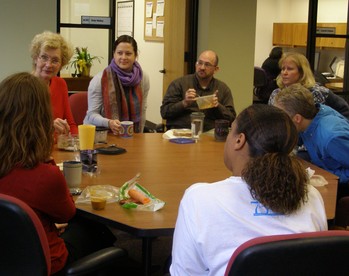The challenge of eating on $4.39 per person per day ― the average Food Stamp allotment in the U.S. ― is being met this week (Nov. 17-23) by more than 300 Presbyterians nationwide who registered for the Presbyterian Church (U.S.A.)’s SNAP Food Stamp Challenge.
Midway through the challenge, a dozen PC(USA) national staffers who have risen to the Challenge gathered over a very simple lunch Thursday (Nov. 21) to share what they have learned about food and poverty in America.
The lessons go way beyond hunger.
“The Food Stamp Challenge has brought an incredible awareness of how much we waste,” said Eileen Schuhmann of the Presbyterian Hunger Program (PHP) staff. Talking about some poorly-cooked beans she prepared earlier in the week, she said, “Ordinarily I would have thrown them out, but my mind has completely shifted with the realization of how little we have to start with. It’s incredible the thinking, planning and calculating that has to go into feeding ourselves on an extreme budget.”
Some participants ― particularly those with families ― have fared okay. “It’s been interesting what we can do,” said Andrew Kang Bartlett, also of the PHP. “We’ve done without meat, fish and desserts,” he said, “but we’ve been able to shop at our usual places and eat pretty well. Of course, because we’re a family (of four), we can stretch some things a little further.”
Gina Chamberlain spoke of “the reality of eating the same things over and over,” noting that many are faced with that monotonous dilemma “because food is one budget item that is adjustable.”
Presbyterian Mission Agency Executive Director Linda Valentine noted that “as food prices rise, a lot of middle class people are living on food budgets similar to Food Stamp recipients.” She also spoke of having to pass up a dinner at her church because of the cost ― $6.
“Before the Food Stamp Challenge, I never thought about how much hospitality is constrained by these economic conditions,” she said. “On this kind of budget it’s impossible to invite people over for a meal and even if I’m invited to someone else’s I can’t ask ‘what can I bring?’ The reality is I can’t afford to bring anything.”
Several participants talked about the stress that trying to feed loved ones on such a budget creates. “It started out rough for us because we waited too long to cook our first crock-pot of rice and beans,” said Ben Albers. “so our first meal was really late and it heightened my awareness of just what it takes to live on an extreme budget.
“And then there’s the sheer stress of simply grocery shopping on an extreme budget,” he added. “Some people can always whip out a credit card, but for Food Stamp Challenge participants, like most Food Stamp recipients, when the allotment’s out, its out.”
Kang Bartlett said trying to feed his family on the Food Stamp allotment “has given me a far greater appreciation for the free breakfast and lunch programs in schools.”
Rebecca Barnes, a single mother with two kids who is associate for environmental justice, quickly added, “And for the ability of kids to take food home with them for the weekends.”
Jennifer Evans talked about “the sheer time it takes just to cook,” with the pressures of full-time work and child-rearing. There’s also the simple fear, she added, “that my daughter won’t like what I can afford to cook on this allotment.”
The Rev. Hunter Farrell, director of World Mission, admitted to being “blind-sided” by the host of issues raised by the Food Stamp Challenge. “I’ve lived overseas,” he said. “Why haven’t I understood this before ― the life of relative privilege really blinds us.”
American culture, he continued, has created a double edged sword. On the one hand, Farrell said, “We’ve created a culture of anger at the poor, and on their side we’ve created a culture of shame.”
Kang Bartlett blames this condition on “economic illiteracy: we just don’t see or understand the larger economic structures that create persistent need.
Throughout the SNAP Food Stamp Challenge, Barnes is producing a blog. Posts to date include:
- http://www.pcusa.org/blogs/eco-journey/2013/11/20/serving-privilege/
- http://www.pcusa.org/blogs/eco-journey/2013/11/19/your-hunger-satiated/
- http://www.pcusa.org/blogs/eco-journey/2013/11/18/first-day-food-stamp-challenge/
- http://www.pcusa.org/blogs/eco-journey/2013/11/13/reflections-preparing-snapfood-stamp-challenge-nex/
Valentine is keeping a journal of her SNAP Food Stamp Challenge experience. Presbyterian News Service will publish her journal at the conclusion of the challenge.

